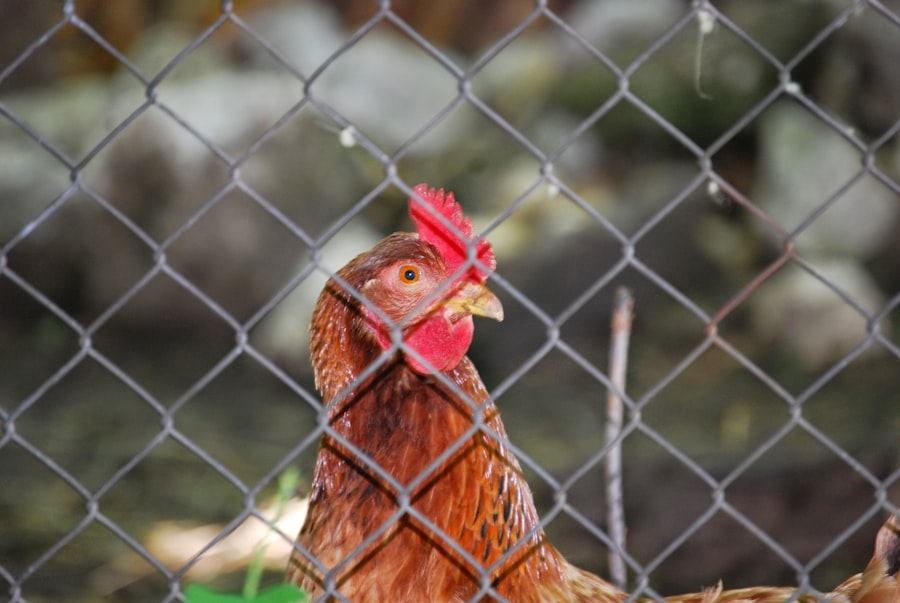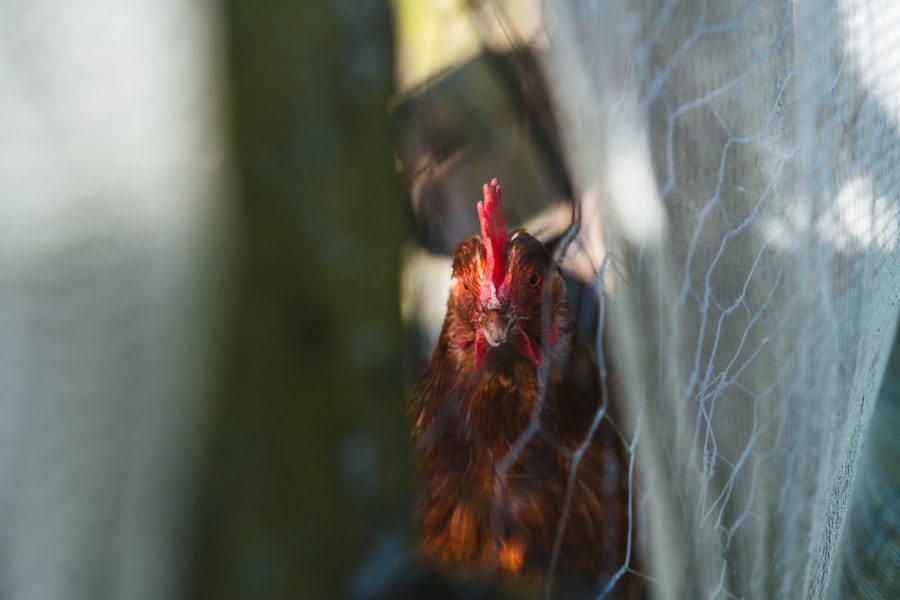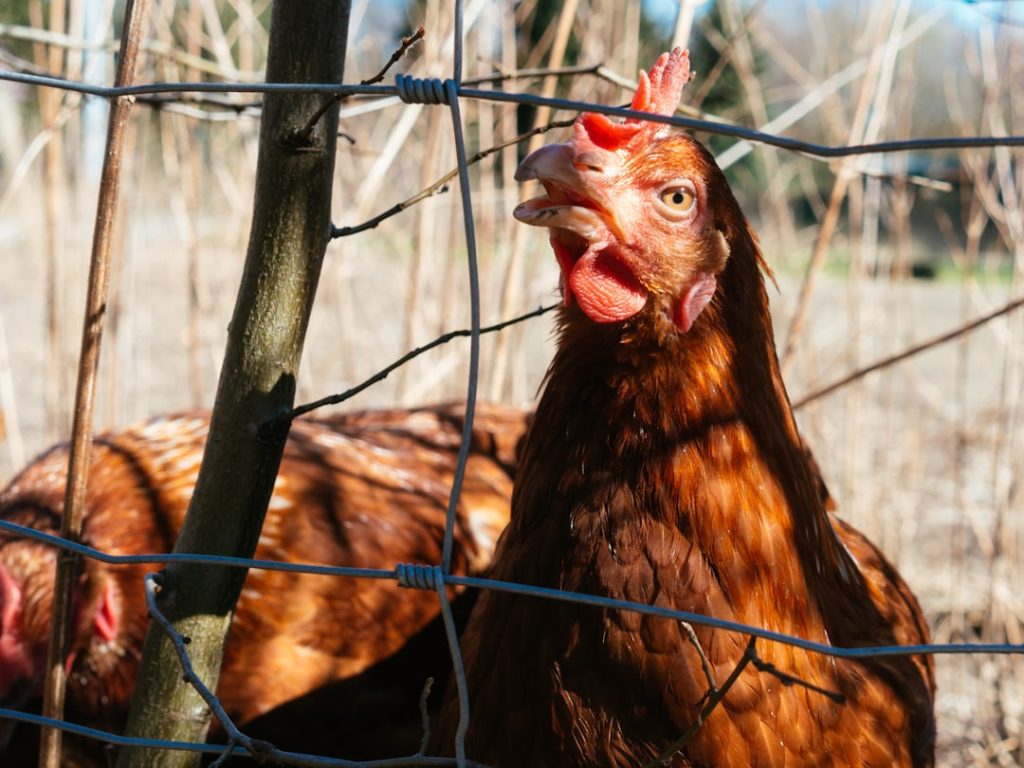Chickens are social creatures that benefit from a structured environment. They establish a hierarchical pecking order within their flock, consisting of dominant and submissive individuals. Understanding this social structure is essential for maintaining a harmonious chicken coop.
Adequate space is necessary to allow chickens to establish their hierarchy without overcrowding, which can lead to aggressive behavior and stress. Chickens are naturally inquisitive and enjoy exploring their surroundings. They also possess a strong instinct to forage, making it important to provide opportunities for scratching and pecking at the ground to support their natural behaviors.
Chickens communicate through various vocalizations and body language. Soft clucking often indicates contentment or excitement, while loud, rapid clucking may signal distress or perceived danger. Recognizing these communication cues is crucial for assessing the well-being of your flock.
By observing and interpreting chicken behavior, caretakers can create an environment that addresses both the physical and psychological needs of these birds, ultimately promoting their health and happiness.
Table of Contents
- 1 Creating a designated area for the chickens
- 2 Using barriers to keep chickens off the patio
- 3 Providing alternative entertainment for the chickens
- 4 Implementing training techniques
- 5 Utilizing natural deterrents
- 6 Seeking professional advice if needed
- 7 FAQs
- 7.1 What are some effective ways to keep chickens off my patio?
- 7.2 Can I use natural repellents to keep chickens off my patio?
- 7.3 Is it possible to train chickens to stay off the patio?
- 7.4 Are there any specific plants that can help keep chickens away from the patio?
- 7.5 What are the benefits of keeping chickens off the patio?
Key Takeaways
- Chickens have natural behaviors such as scratching, pecking, and dust bathing that should be understood and accommodated in their living environment.
- Designating a specific area for chickens to roam and forage can help keep them contained and prevent damage to other parts of the property.
- Barriers such as fencing or gates can be used to keep chickens off the patio and other areas where they are not welcome.
- Providing items such as hanging treats, mirrors, or perches can offer chickens alternative entertainment and stimulation.
- Training techniques such as positive reinforcement can be used to teach chickens to stay out of certain areas or to follow specific commands.
- Natural deterrents such as citrus peels, vinegar, or certain plants can be used to discourage chickens from entering certain areas.
- Seeking professional advice from a veterinarian or experienced chicken keeper can provide valuable insights and solutions for managing chicken behavior and living spaces.
Creating a designated area for the chickens
The Importance of a Secure Coop
A designated area for your chickens is crucial for their safety and well-being. This area should include a secure coop for roosting and laying eggs, as well as a spacious outdoor run for exercise and foraging. The coop should be well-ventilated and predator-proof, with nesting boxes for laying eggs and perches for roosting at night.
A Safe and Spacious Outdoor Run
The outdoor run should be enclosed with sturdy fencing to keep out predators and provide ample space for the chickens to move around and explore. This will allow them to engage in natural behaviors such as foraging and exercising.
Providing for Your Chickens’ Needs
In addition to the coop and run, it’s essential to provide your chickens with access to fresh water and a balanced diet. This may include commercial chicken feed, as well as opportunities for free-ranging and foraging for insects and plants. By providing for all of your chickens’ needs, you can ensure that they are safe, healthy, and happy.
Using barriers to keep chickens off the patio

Chickens are naturally curious and may be drawn to explore areas of your property that you’d prefer they avoid, such as the patio. Using barriers to keep chickens off the patio can help protect your outdoor living space while still allowing your chickens to roam freely in designated areas. One effective barrier option is installing a low fence or gate around the perimeter of the patio to prevent chickens from accessing it.
This can be made from materials such as wood, metal, or plastic, and should be tall enough to prevent the chickens from flying or jumping over it. Another option is to use natural barriers such as plants or shrubs to create a visual and physical deterrent for the chickens. By strategically placing these barriers around the patio, you can create a natural boundary that discourages the chickens from venturing onto the patio.
Additionally, using visual deterrents such as scarecrows or reflective objects can help keep chickens away from the patio by creating a sense of unease or confusion. By using barriers and other deterrents, you can protect your patio while still allowing your chickens to roam freely in other areas of your property.
Providing alternative entertainment for the chickens
Chickens are intelligent and curious animals that benefit from mental stimulation and enrichment. Providing alternative entertainment for your chickens can help prevent boredom and reduce stress, leading to happier and healthier birds. One option is to provide your chickens with toys and objects to peck at and explore, such as hanging mirrors, balls, or treat dispensers.
These items can provide hours of entertainment for your chickens while encouraging natural behaviors such as pecking and scratching. Another option is to create a chicken-friendly garden or foraging area where your chickens can explore and discover new plants, insects, and other natural elements. This can include planting edible herbs and vegetables that your chickens can peck at, as well as providing opportunities for them to scratch and dig in the soil.
By providing alternative entertainment for your chickens, you can keep them mentally engaged and physically active, leading to happier and healthier birds.
Implementing training techniques
Implementing training techniques can help teach your chickens to avoid certain areas of your property, such as the patio, while still allowing them to roam freely in other designated areas. One effective training technique is using positive reinforcement, such as treats or praise, to reward your chickens for staying away from the patio. For example, you can offer treats when the chickens stay within their designated area or when they respond to a specific cue or command.
Another training technique is using deterrents such as water sprays or noise makers to discourage the chickens from venturing onto the patio. By consistently using these deterrents when the chickens approach the patio, they will learn to associate this area with an unpleasant experience and will be more likely to avoid it in the future. By implementing training techniques, you can teach your chickens to respect boundaries while still allowing them to roam freely in other areas of your property.
Utilizing natural deterrents

Natural Barriers
One natural deterrent is using strong-smelling herbs or plants, such as lavender or mint, around the perimeter of the patio to create a barrier that repels the chickens. These scents are unpleasant to chickens and can help discourage them from venturing onto the patio.
Predator Decoys and Sound Machines
Another natural deterrent is using predator decoys or sound machines that mimic the calls of predatory birds or animals. These decoys and sounds can create a sense of danger or unease for the chickens, leading them to avoid the area around the patio.
Effective and Humane Solution
By utilizing natural deterrents, you can keep your patio free from chicken activity while still allowing your birds to roam freely in other areas of your property.
Seeking professional advice if needed
If you’re struggling to keep your chickens off the patio or are experiencing other behavioral challenges with your flock, seeking professional advice can be beneficial. A professional animal behaviorist or poultry expert can provide personalized guidance and support based on your specific situation. They can help identify the underlying causes of the behavior and develop a tailored plan to address it effectively.
Additionally, seeking advice from other chicken owners or joining online forums and communities can provide valuable insights and support from individuals who have experience with similar challenges. By seeking professional advice if needed, you can gain valuable knowledge and resources to help create a harmonious environment for your chickens while protecting your outdoor living spaces. In conclusion, understanding the behavior of chickens is essential for creating a harmonious environment for your flock.
By providing a designated area with ample space, shelter, food, and water, you can ensure that your chickens are safe, healthy, and happy. Using barriers, alternative entertainment, training techniques, natural deterrents, and seeking professional advice if needed can help keep your chickens off the patio while still allowing them to roam freely in other areas of your property. With proper care and attention, you can create a balanced and enriching environment for your chickens that meets their physical and psychological needs while protecting your outdoor living spaces.
If you’re struggling to keep your chickens off your patio, you may want to consider building a chicken coop and run to give them a designated space to roam. Poultry Wizard offers helpful tips and plans for building a chicken coop and run in their article “Chicken Coop Run Plans”. This resource can provide you with the guidance you need to create a safe and comfortable environment for your chickens, ultimately keeping them off your patio.
FAQs
What are some effective ways to keep chickens off my patio?
Some effective ways to keep chickens off your patio include installing physical barriers such as fences or gates, using repellents or deterrents, and training your chickens to stay away from the patio area.
Can I use natural repellents to keep chickens off my patio?
Yes, natural repellents such as citrus peels, coffee grounds, or vinegar can be used to deter chickens from entering the patio area. These natural scents are often unpleasant to chickens and can help keep them away.
Is it possible to train chickens to stay off the patio?
Yes, it is possible to train chickens to stay off the patio by using positive reinforcement techniques such as rewarding them for staying in designated areas and gently guiding them away from the patio when they approach.
Are there any specific plants that can help keep chickens away from the patio?
Yes, certain plants such as marigolds, lavender, or mint can help repel chickens due to their strong scents. Planting these around the perimeter of the patio can help discourage chickens from entering the area.
What are the benefits of keeping chickens off the patio?
Keeping chickens off the patio can help maintain a clean and tidy outdoor space, prevent damage to patio furniture and plants, and reduce the risk of chicken droppings and feathers being left on the patio.
Meet Walter, the feathered-friend fanatic of Florida! Nestled in the sunshine state, Walter struts through life with his feathered companions, clucking his way to happiness. With a coop that’s fancier than a five-star hotel, he’s the Don Juan of the chicken world. When he’s not teaching his hens to do the cha-cha, you’ll find him in a heated debate with his prized rooster, Sir Clucks-a-Lot. Walter’s poultry passion is no yolk; he’s the sunny-side-up guy you never knew you needed in your flock of friends!







